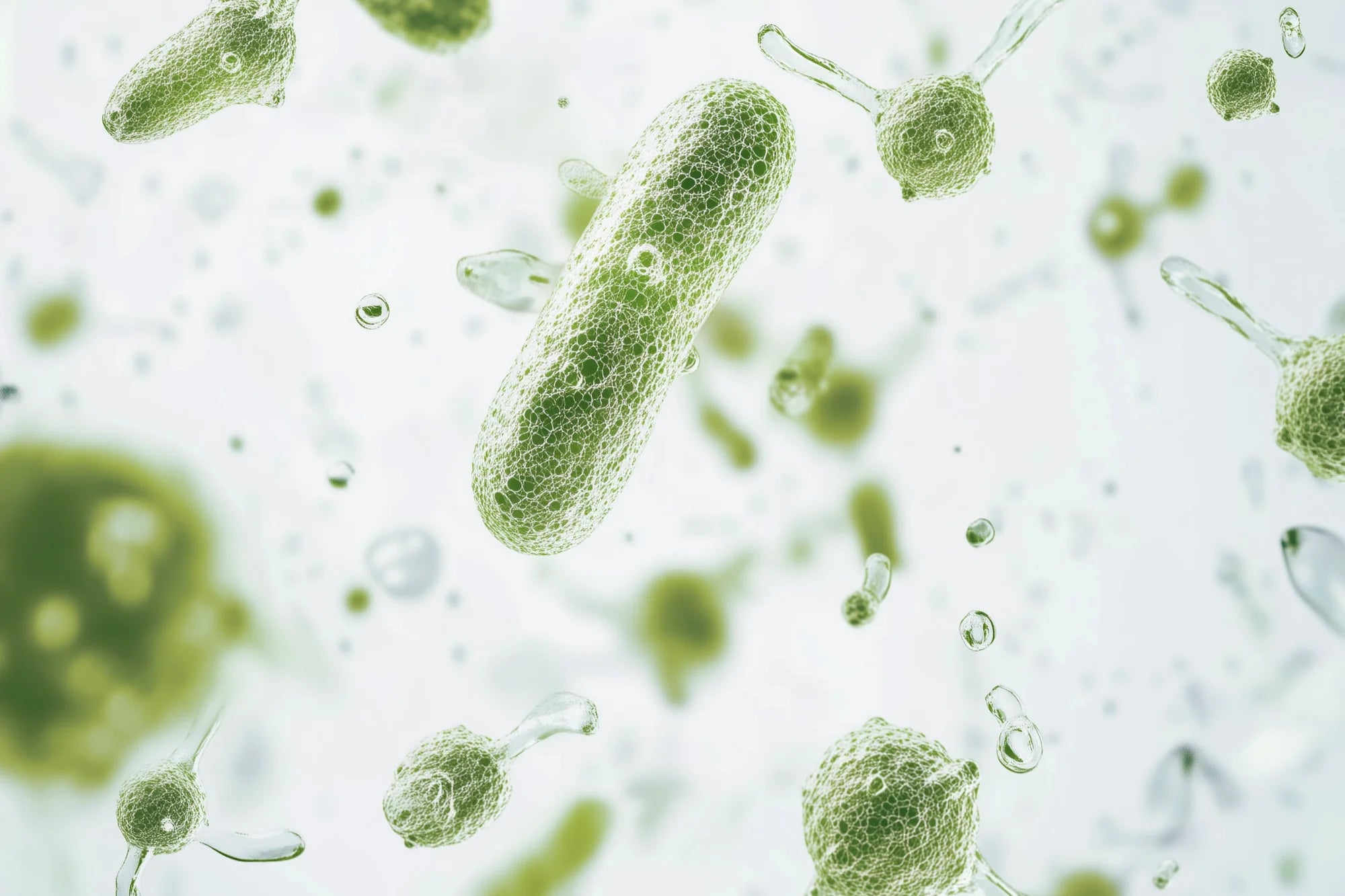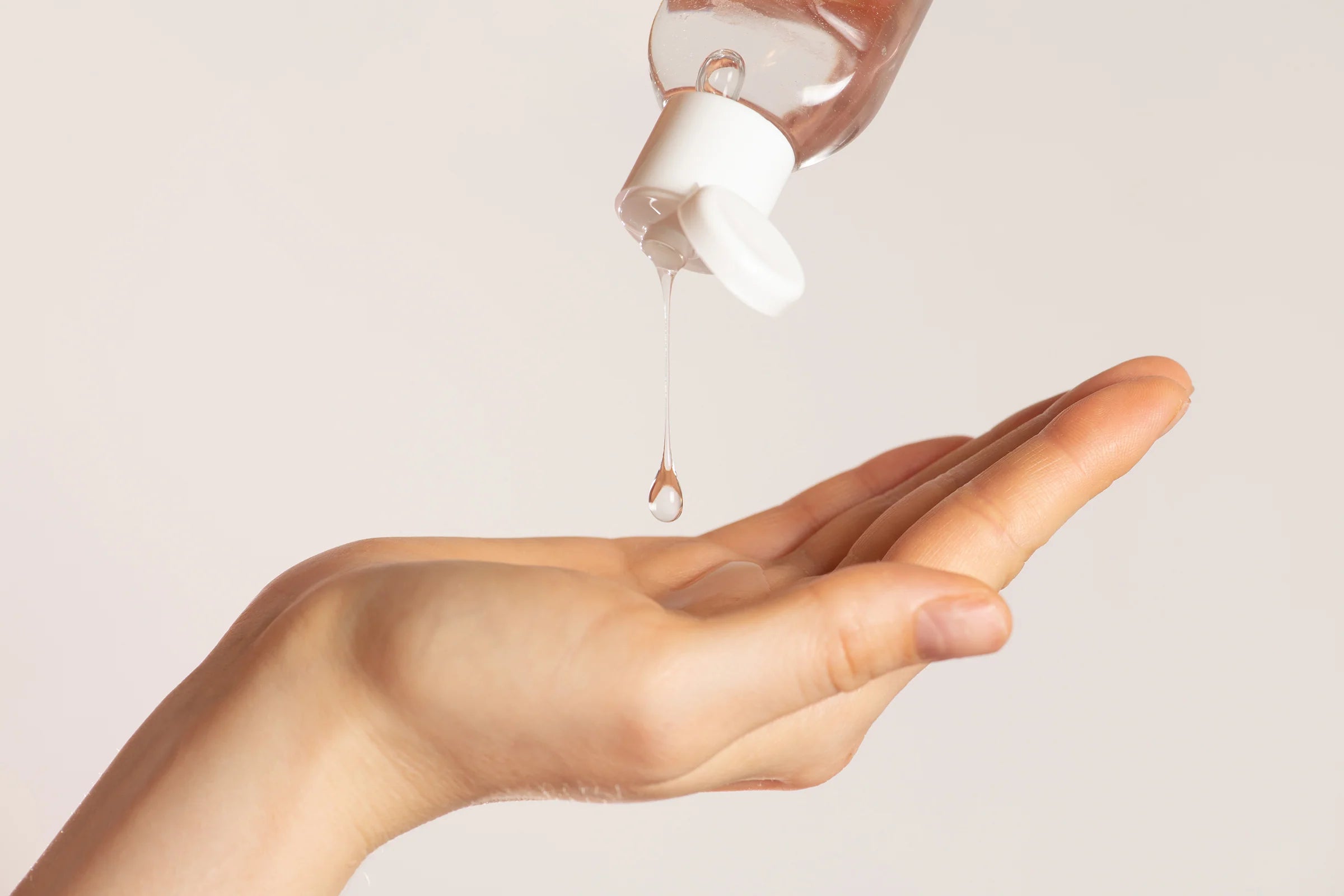Artikel: Antibakteriell vs. antimikrobiell: Was ist der Unterschied?

Antibakteriell vs. antimikrobiell: Was ist der Unterschied?
Wenn es um den Schutz Ihrer Haut geht, gibt es mehr als nur eine gute Reinigung. Wörter wie „antibakteriell“ und „antimikrobiell“ tauchen überall auf Produktetiketten auf, aber was bedeuten sie wirklich? Viele Menschen verwenden die Begriffe synonym, weil sie glauben, dass sie das gleiche Schutzniveau bieten. Obwohl antimikrobielle Hautpflege von Natur aus antibakteriell ist, ist das Gegenteil nicht der Fall.
Wenn Sie die Unterschiede zwischen beiden verstehen, können Sie die richtigen Produkte für Ihre Haut auswählen und so für eine bessere Gesundheit und Hygiene sorgen. Um besser aufzuschlüsseln, was diese auszeichnet, werfen wir zunächst einen Blick auf ihre Definitionen:
- Antibakterielle Produkte zielen gezielt auf Bakterien ab und töten diese ab.
- Antimikrobielle Produkte zielen auf ein breiteres Spektrum von Mikroorganismen, einschließlich Bakterien, Pilzen und Viren.
Der Unterschied zwischen antibakteriell und antimikrobiell
Der Hauptunterschied zwischen antibakteriellen und antimikrobiellen Mitteln liegt in den Organismen, auf die sie abzielen. Zu den Mikroorganismen zählen verschiedene Lebensformen: Bakterien, Viren und Pilze. Antibakterielle Produkte wirken gegen Bakterien, während antimikrobielle Produkte ein breiteres Spektrum schädlicher Mikroorganismen, einschließlich Bakterien, bekämpfen können.
Es ist auch wichtig zu beachten, dass Bakterien selbst variieren können – oft kategorisiert als gram-positive und gram-negative Bakterien. Während antibakterielle Produkte Bakterien abtöten können, sind nicht alle in der Lage, alle Typen zu eliminieren. Zum Beispiel haben gram-positive Bakterien dickere Zellwände, was es schwieriger macht, sie mit standardmäßigen antibakteriellen Mitteln abzutöten.
Wie sie Keime beseitigen
Antibakterielle Wirkstoffe wirken, indem sie entweder die Zellwände von Bakterien zerstören, die Zellreplikation verhindern oder den Stoffwechsel der Bakterien stören. Häufige Beispiele sind alkoholbasierte Händedesinfektionsmittel und bestimmte Seifen zur Reinigung der Haut.
Antimikrobielle Wirkstoffe hingegen stören die Zellmembranen verschiedener Mikroben, stören ihren DNA-Replikationsprozess oder deaktivieren sie auf verschiedene Weise. Vereinfacht ausgedrückt ermöglicht diese breitere Wirkung, dass diese Produkte ein breites Spektrum an Organismen eliminieren, was sie äußerst vielseitig und wirksam macht.
Die Rolle von Alkohol bei der Abtötung von Mikroorganismen
Alkohol gilt als das häufigste Mittel sowohl in antibakteriellen als auch in antimikrobiellen Produkten und wird seit Jahrzehnten zum Schutz vor Keimen eingesetzt. Es wirkt, indem es Proteine denaturiert und Lipide auflöst, was zur Zellzerstörung und Keimeliminierung führt.
Allerdings ist Alkohol nicht der einzige Weg, um Mikroorganismen effektiv zu bekämpfen. Viele antimikrobielle Hautpflegeprodukte verwenden sanfte, alkoholfreie Inhaltsstoffe, um eine ausgewogenere, hautfreundliche Lösung anzubieten, die Mikroorganismen effektiv beseitigt. Das bedeutet, dass Sie von der antimikrobiellen Kraft profitieren können, ohne die Härte und schnelle Verdunstung von Alkohol, der dafür bekannt ist, die Haut auszutrocknen und zu reizen.
Es ist auch erwähnenswert, dass alkoholbasierte Hautpflegeprodukte nicht die beste Wahl für Menschen mit empfindlichen Hautzuständen sind. Die National Eczema Association empfiehlt, Produkte mit Alkohol und Duftstoffen zu vermeiden. Alkohol kann auch Risiken für schwangere Frauen und Kinder darstellen.


Ist eines besser als das andere?
Die Wahl zwischen antibakteriellen und antimikrobiellen Produkten hängt von Ihren spezifischen Bedürfnissen ab. Wenn Ihr Ziel darin besteht, Bakterien zu beseitigen, könnte ein antibakterielles Produkt ausreichen. Für eine gründliche Reinigung, die vor einer Vielzahl schädlicher Keime schützt, ist die Entscheidung für antimikrobielle Lösungen jedoch die klügere Wahl.
Warum sollten Sie sich für antimikrobielle Hautpflegeprodukte entscheiden?
Verbesserter Schutz
Mit der Fähigkeit, mehr Mikroorganismen als nur Bakterien abzutöten, bieten antimikrobielle Hautpflegeprodukte einen umfassenderen Ansatz zum Hautschutz. Indem sie ein breiteres Spektrum an Keimen bekämpfen, tragen sie dazu bei, die Haut frei von schädlichen Eindringlingen zu halten, die Hautinfektionen oder -reizungen verursachen könnten.
Vorbeugung von Hautproblemen
Die Verwendung antimikrobieller Hautpflegeprodukte kann dazu beitragen, einer Reihe von Hautproblemen wie Dermatitis, Akne und Pilzinfektionen vorzubeugen. Durch die Aufrechterhaltung einer saubereren Hautumgebung können diese Produkte die allgemeine Hautgesundheit und nicht nur die Widerstandskraft gegen Krankheiten unterstützen.
Sanft zur Hautbarriere
"Während nicht alle antimikrobiellen Produkte sanft sind, bieten die antimikrobiellen Formeln von Laboratory Skin Care® (LSC) effektiven Schutz, ohne die natürliche Barriere Ihrer Haut zu stören. Im Gegensatz zu härteren Alternativen sind diese Lösungen so konzipiert, dass sie sanft, sicher und für alle Hauttypen geeignet sind – alles dank der patentierten Hydroxysomes® von LSC."
Das wegnehmen
Wenn Sie den Unterschied zwischen antibakteriellen und antimikrobiellen Produkten verstehen, können Sie fundierte Entscheidungen für Ihre Hautpflege- und Hygienebedürfnisse treffen. Während Antibiotika Bakterien abtöten, bieten antimikrobielle Produkte einen umfassenderen und vielseitigeren Schutz.
Antibakterielle Produkte:
- Nur Zielbakterien.
- Wird häufig in Händedesinfektionsmitteln, Seifen und Tüchern verwendet.
- Wirksam für die sofortige und kurzfristige Desinfektion.
Antimikrobielle Produkte:
- Zielen Sie auf ein breites Spektrum an Mikroorganismen ab, darunter Bakterien, Pilze und Viren.
- Wird in der Hautpflege, Wundversorgung und in Reinigungsmitteln verwendet.
- Bieten Sie einen umfassenderen und länger anhaltenden Schutz.
Die Auswahl der richtigen Produkte hängt von Ihren spezifischen Bedürfnissen ab, aber für einen umfassenden Ansatz für Hygiene und Hautgesundheit sind die innovativen Lösungen von LSC eine gute Wahl. Mit einem antimikrobiellen Reiniger, der 99,9 % der Mikroorganismen entfernt, und einer antimikrobiellen Feuchtigkeitscreme, die nach der Anwendung noch mehr als vier Stunden lang schützt, können Sie sicher sein, dass Ihre Haut den ganzen Tag über geschützt und gepflegt bleibt.

